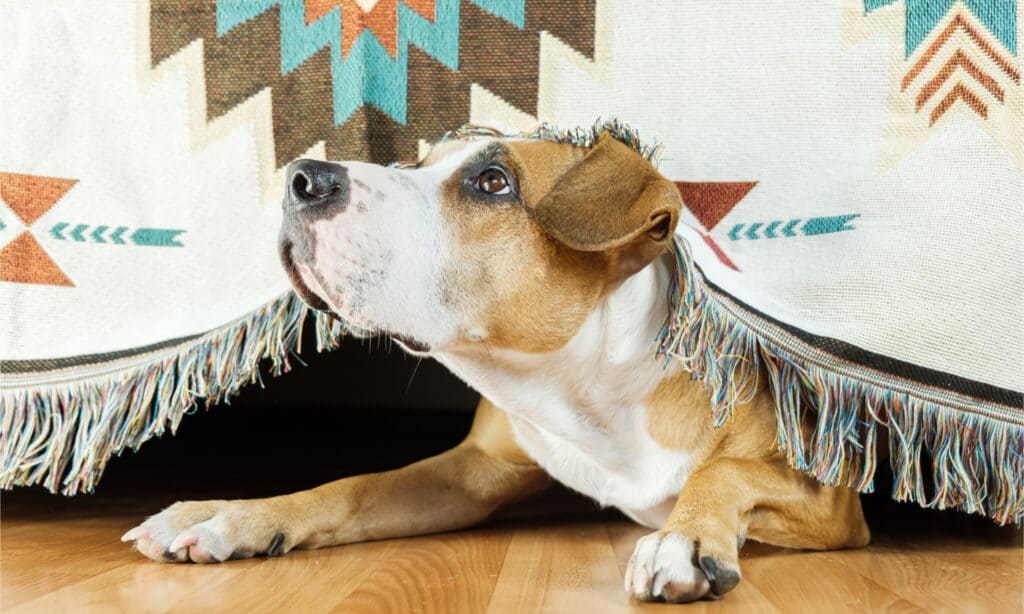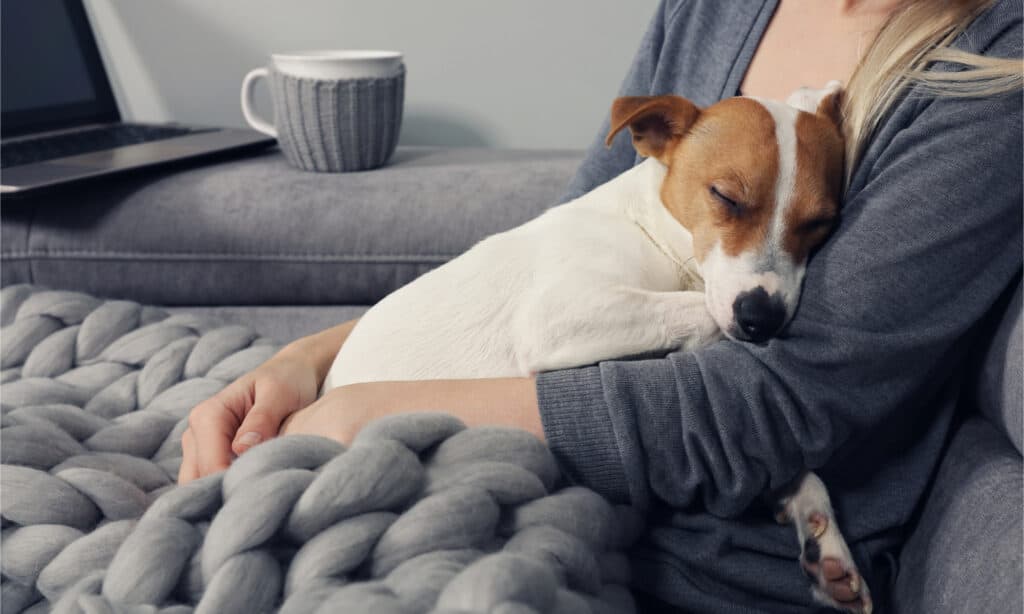Some dogs are absolutely terrified of fireworks. The sound of the loud booms can send them running with their tail tucked looking for cover. But what’s strange is that some dogs don’t react this way. In fact, some dogs are not scared of fireworks at all. Why is it that fireworks can cause so much stress and anxiety for some dogs and others can be completely unaffected by them?
Fireworks Are Loud
The most obvious reason why some dogs are afraid of fireworks is that they can be very loud. Dogs are known to have a much more acute sense of hearing than we do. They can hear more than twice as many frequencies as we can and they can also hear things up to four times further away. This heightened sense of sound combined with the loud explosiveness of fireworks can make for a very terrifying combination.
Imagine hearing fireworks more loudly and clearly than you do now and not being able to understand what was causing the sound. This is what it is like for dogs and is one of the main reasons why it causes them so much fear. For dogs, sound dictates their experience of the world, and reacting to every loud or strange sound they hear would demand far too much energy. Therefore, their brains have adapted to tune out some of the sounds. This trait is more prevalent in some dogs than others.
For example, working dogs like the ones used in the military and for detection, are able to remain calm in very stressful environments where they may be around loud sounds like explosions in war. These dogs have a bit more “auditory flexibility” that allows them to determine which sounds are significant and which can essentially be tuned out.
However, for many dogs today, evolution has taught them that avoiding a perceived threat is more important and worth it for their overall survival, even if the perceived threat (the fireworks) doesn’t end up being real. This function is what would help them survive if the threat did in fact end up being a real one. So from a biological perspective, it pays to be cautious.

Many dogs perceive sudden loud noises like fireworks as a threat.
©Aleksey Boyko/Shutterstock.com
Early Life Conditioning
A dog’s early life can determine how sensitive they are to loud sounds. Just like human babies, puppies go through distinct, critical stages of development where their brains form associations that can greatly influence their behavior for the rest of their lives. Puppies go through a period of time where their brains are learning to determine what is considered normal in the world, as well as what they should and should not be afraid of.
If they experience something traumatic or frightening during this period, they may grow up and continue to be afraid of that situation for life. At the age of around 12 weeks (when most dogs are adopted), they will start to develop a fear response. So, if they experience something new and freighting after the age of three months, they can learn to be afraid of that thing going forward, unless corrected.
Genetics Can Determine Stress Levels
There are, however, some dogs that have little to no negative association with loud sounds and are still very afraid of the sound of fireworks. Unlike those that had a scary experience and then learned to fear loud sounds going forward, some dogs’ fear responses can be boiled down to temperament.
Temperament differs from personality and mood (which are both fluid emotional states) in the way that it is a deeper, more hard-wired system that’s affected by early development and genetics. In short, it is the way that an animal’s genes are influenced by external factors. Temperament plays a very significant role in a dog’s inherent predisposition to fear, anxiety, and stress.
As an example, studies have found that in both humans and animals, mothers who experience high levels of stress during pregnancy can pass on a propensity of anxiety to their offspring via the stress hormone cortisol. When a stress-inducing event takes place (or a perceived stressful event) the brain’s hypothalamic-pituitary-adrenal axis (HPA) activates and starts producing cortisol. Having high levels of cortisol in the blood can have negative effects on the baby or puppy as it develops.
How Can I Keep My Dog Calm During Fireworks?
Now that we’ve gone over some of the reasons why some dogs are afraid of the sound of fireworks and others aren’t, it’s time to take a look at some things you can do to help your dog remain calm. Here are some tips you can try:
Keep Your Dog Inside
One of the most obvious things you can do to limit your dog’s fear is to keep him inside during fireworks. Some owners leave their dogs outside for portions of the day, but if you know there will be fireworks, bring your dog inside for that time period. That way your dog doesn’t feel like it’s trapped outside with nowhere to run or hide from the fireworks.
Bringing the dog in will at least somewhat muffle the loud sounds, as well as allow your dog to have places to hide if it feels the need to. Also, just being able to be near you will help your dog feel more at ease rather than being left alone out in the elements. It will also prevent him from running away. Many dogs are reported missing during firework celebrations since they tend to get scared and go running off.
Create a Safe Space
Once you have your dog inside of the house you can make sure that you have a safe space for him. If he feels comfortable being inside of his crate you can place him inside of it so that he feels protected. If not, you can try putting him in the bathroom with a nice, comfortable blanket or his dog bed, as well as a few of his favorite toys so that he has something fun to do to take his mind off of the fireworks.
You can even try playing some white noise in the room or calming music that will help drown out the loud booms. If your dog prefers to be close to you during this time, try not to deny him of that. You want your dog to know that it should feel safe and comfortable and that you are there for him to provide him with the safety that he needs.

It’s important to make your dog feel safe when they’re afraid of loud noises.
©iStock.com/Albina Gavrilovic
Try Using a Calming Wrap or Vest
A calming vest or wrap can be worn by your dog to help it cope with anxiety during high-stress situations. You can try wrapping one of these calming vests around your dog during the duration of the fireworks. The vests work by applying a light, constant pressure while your dog wears it.
Many dogs will find this pressure to be both soothing and calming. The theory is that the pressure applied to the dog’s torso provides a calming effect similar to that of swaddling a crying infant or hugging a person in distress. Calming vests are very popular amongst pet owners who have very anxious dogs.
Desensitization Training
This is another method you can try to train your dog to no longer be afraid of fireworks. If you know that a fireworks celebration is coming up, you can try to train your dog in advance to help him lessen his fear of them. You can start this process by first playing fireworks sounds at a low volume while you play with your dog and give him treats. Over time, you’ll want to slowly increase the volume of the fireworks during each play session. Doing this will eventually train your dog to associate the sound of fireworks with happy, fun moments and will lessen his fear of the sound in general.
CBD for Anxiety
One of the fastest-growing remedies in pet care is using hemp or CBD to help dogs and other animals better cope with anxiety. CBD is a compound that is found in cannabis and hemp. Research has found that it helps to manage anxiety in dogs by changing the brain’s receptor responses to serotonin. Providing your dog with CBD supplements helps give them the benefit of relaxation without any intoxicating symptoms since there is almost no THC or psychoactive compound. This can help your dog relax a bit whenever there are unavoidable situations where there will be fireworks or other loud sounds.
The photo featured at the top of this post is © smrm1977/Shutterstock.com
Ready to discover the top 10 cutest dog breeds in the entire world?
How about the fastest dogs, the largest dogs and those that are -- quite frankly -- just the kindest dogs on the planet? Each day, AZ Animals sends out lists just like this to our thousands of email subscribers. And the best part? It's FREE. Join today by entering your email below.
Thank you for reading! Have some feedback for us? Contact the AZ Animals editorial team.






